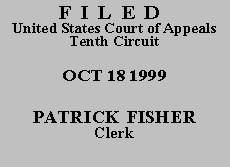

| RICHARD G. WEAVER,
Petitioner-Appellant, v. THOMAS M. TUGGLE, Judge, District Court Cloud County, Kansas; ROBERT A. WALSH, Cloud County Attorney; ATTORNEY GENERAL OF THE STATE OF KANSAS, Respondents-Appellees. |
|
Petitioner seeks a certificate of appealability to appeal the district court's denial of his petition for writ of habeas corpus under 28 U.S.C. § 2254. Because petitioner has failed to make "a substantial showing of the denial of a constitutional right," 28 U.S.C. § 2253(c)(2), we deny the certificate of appealability and dismiss the appeal.
Petitioner was convicted of battery against a law enforcement officer in violation of Kan. Stat. Ann. § 21-3413 and sentenced to six months' imprisonment in the county jail. The charges stemmed from an altercation between petitioner and two officers, a Kansas highway patrolman and a local sheriff's deputy. The officers were investigating a report of gunshots when they saw petitioner emerge from a field with a shotgun and a beer. Although petitioner verbally identified himself, he refused to produce a driver's license or other confirming documentation and eventually struck the state trooper three times. The trial court denied his motion to suppress--as the fruit of an illegal seizure--all evidence and testimony obtained after the point petitioner told the officers his name.
The state court of appeals affirmed the conviction, determining that under the circumstances the officers had a reasonable or articulable suspicion of possible criminal activity justifying a stop of petitioner for further investigation under the principles set forth in Terry v. Ohio, 392 U.S. 1 (1968) and Kan. Stat. Ann. § 22-2402(1). See Appellant's App. at 5. The court also determined that the evidence was sufficient to support petitioner's conviction. See Appellant's App. at 7-8.
The district court determined that the State had afforded petitioner an opportunity for full and fair litigation of his Fourth Amendment illegal seizure claim and that he was not entitled to habeas relief on the ground that evidence obtained in an unconstitutional seizure was introduced at his trial. See Stone v. Powell, 428 U.S. 465, 481-82 (1976). We agree with the district court that petitioner was afforded the required opportunity to litigate his Fourth Amendment claim in state court and that proper constitutional standards were applied.
Petitioner also contends that the evidence was insufficient to support his conviction. In his appendix, petitioner has included selected parts of his trial transcript intended to support his argument. However, "failure to file a trial transcript precludes review of a conviction for sufficiency of the evidence." United States v. Vasquez, 985 F.2d 491, 495 (10th Cir. 1993). Because petitioner has failed to file a complete transcript, his sufficiency of the evidence claim is waived. See id.; see also 10th Cir. R. 10.1.1(a) ("When sufficiency of the evidence is raised, the entire relevant trial transcript must be provided."). In any event, we note that the district court had the relevant transcript and found the evidence sufficient.
The certificate of appealability is DENIED and the appeal is DISMISSED.
Entered for the Court
Circuit Judge
*. This order and judgment is not binding precedent, except under the doctrines of law of the case, res judicata, and collateral estoppel. The court generally disfavors the citation of orders and judgments; nevertheless, an order and judgment may be cited under the terms and conditions of 10th Cir. R. 36.3.